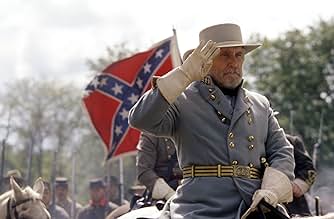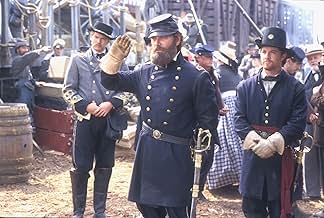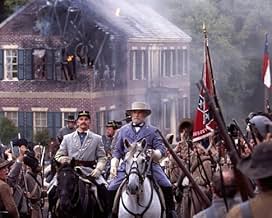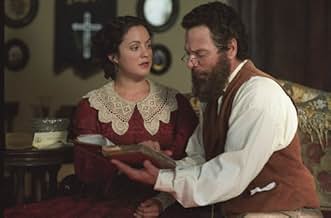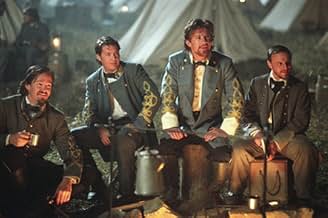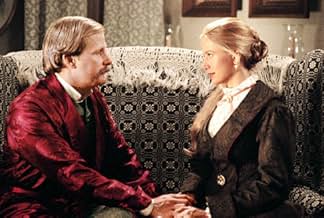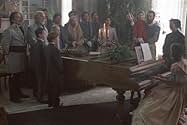The rise and fall of confederate general Thomas "Stonewall" Jackson, as he meets with military success against the Union from 1861 to 1863, when he is accidentally killed by his own soldiers... Read allThe rise and fall of confederate general Thomas "Stonewall" Jackson, as he meets with military success against the Union from 1861 to 1863, when he is accidentally killed by his own soldiers.The rise and fall of confederate general Thomas "Stonewall" Jackson, as he meets with military success against the Union from 1861 to 1863, when he is accidentally killed by his own soldiers.
- Awards
- 1 win & 4 nominations total
- Gen. James Kemper
- (as Royce Applegate)
- Confederate General
- (as Robert C. Byrd)
- Director
- Writers
- All cast & crew
- Production, box office & more at IMDbPro
Featured reviews
Regarding the lack of political correctness, which in my opinion is our modern version of hypocrisy (we can do anything we want as long as we call it by another name) I would like to point out that this is an attempt at a historical movie and that the Civil War was NOT fought to free the slaves, nor were many people in the North comfortable with the concept of a franchised Negro. And some slaves in the South were relatively well treated by their owners, not that they probably didn't want freedom, but they didn't particularly wish their masters ill. The system was set up so that everyone involved, slaves and masters, had something to lose by destroying the status quo, and that's a very difficult thing for people to do. It's easy for us now to say 'they should have freed the slaves' but if you knew that to free your slaves would beggar your children, would you be able to do it?
As with Gettysburg, the battle scenes were impressive and awe-inspiring. And they made the strategy and tactics clear to the viewer which is a monumental achievement, not to mention showing the pure courage on both sides, going to probably death or dismemberment without flinching. I would have liked more about the Northern command struggles to balance the picture but I can see how tempting it was to show the Southern victories to balance the horrible defeat at Gettysburg -- and this picture is meant to be one of a trilogy. I can only hope that word of mouth defeats the critics and gets this movie the audience it deserves.
I find it interesting how almost no emphasis is put on any commanding Union general in either film, with only about 2 minutes of dialouge between Hancock and Burnside before the disaster at Fredericksberg. It should always be noted that Lee's early victories can be credited equally on the Union commanders utter incompotence as well as Lee's exeptional stratigic ability.
I'm sure "The last full measure" (the final film of the trilogy) will put a fair amount of emphasis on General Grant as he assumes command for the Army of the Potamac in 1864. I just hope we dont have another 10-year interval between films.
They are both great films. They have not been the box-office hits because of their legnth and a lack of hard-core history lovers to pay up at the theatre. I'm sure that "Gods" will be aired on TBS soon in a 2 part "mini-series" format to very good ratings as "Gettysberg" did.
`Gods and Generals,' which begins right after the firing on Fort Sumter and ends shortly before the Battle of Gettysburg, is the first part of a planned trilogy. Despite a handful of `name' players in the cast (Robert Duvall, Jeff Daniels, Mira Sorvino and even Ted Turner in a ludicrous cameo appearance), writer/director Ronald F. Maxwell is unable to bring a single character in his film to convincing life (with the possible exception of `Stonewall' Jackson, who gets to carry the burden of what little drama the film has almost single-handedly). In lieu of dialogue, the actors spend most of their time looking wistfully up to heaven or scanning the mist-shrouded horizon while delivering endless homilies about the rightness of the cause and the place of God in human affairs. To keep it all palatable for more enlightened and egalitarian-minded modern audiences, the filmmakers are quick to have the Southern characters declare that, even though the South is forced to fight against the North to protect its God-given right to sovereignty, they, as individuals, are all personally opposed to slavery as an institution and firmly believe that their resident blacks will be freed someday as a matter of course. Hell, the Northerners in this film seem more prejudiced against black people than the Southerners, who just can't say enough good things about their sycophantic slaves.
The battle scenes, though well staged and appropriately graphic in nature, are strangely unmoving, primarily because we have no emotional stake in any of the characters we see doing the fighting. Without anyone for us to focus on and care about, the audience becomes little more than curious bystanders, passive and unengaged observers of this brutal display of ritualized slaughter. Although the visuals are splendid throughout, the musical score, except in a few places, is like a thick, heavy syrup poured over the entire film.
By providing subtitled identification of the principal people, places, dates and battles, `Gods and Generals' does provide a service as a history lesson of sorts. As a drama, however, the film is woefully lacking in every way imaginable. `Gods and Generals' may thrill the heart of the diehard Civil War buff. The rest of us will have to stick to our dreams of Scarlett and Rhett, and of a romanticized vision of the South that only a Golden Age Hollywood mogul would have dared come up with.
Instead of focusing on the main character, his background, why he was a truly great and complicated man, we're constantly distracted from him by many, many different plots. Jeff Daniel's Chamberlain, as seen in the previous movie, multiple unnamed union and confederate soldiers, townsfolk, lots of backstory of Robert E Lee, even John Wilkes Booth is portrayed, for some reason, for extended periods of time. All this time spent on story lines makes the viewer feel alienated and confused any time our main character, Stonewall appears, and we think, "Wait...who was this guy again?"
Jackson was indeed a fascinating character, probably the most fascinating of any of the confederates. He was modest weirdo of a man, employed as a professor at a military school, and was much despised by his students and fellow faculty because of his ineptitude as a teacher. He showed no sign of greatness, or even competence, whatsoever, before the war. He also seems to be a genuinely good man at heart, unconcerned with the conventions of the south aside from his ardent, zealous, devotion to Christianity. He created a bible school for slaves, teaching them to read, and the only slaves he owned were those he met through this, who actually came to him and requested that he buy them, knowing they'd be well treated under his roof. He was unconcerned with the politics of the war, and had always been against the notion of it. He fought for the confederacy simply because Virginia was his home, and that's what side it was on; which was the sole reason many other confederates fought.
What made him famous, however, was not his good nature but his absolute brutality, his single minded devotion to making his war as horrible and unpalatable to both sides of the conflict, in order, in his eyes, to reach the most humane goal of ending it quickly. Something dark and cold seemed to awaken in him, transforming this strange little professor into a rabid, brutal taskmaster of a general who saw men as merely a resource to expend in order to reach his next objective, which was always his sole concern. He forced march his men to death and starvation many times, in fact with regularity so, he constantly quarreled with his subordinates, court-martialing them for any perceived offense, openly admonishing their character and abilities, and he was an ardent believer in the "Black Flag," meaning no quarter for the enemy, all prisoners executed, no restraint shown in any way towards northern civilians (or even southern ones if necessary) or soldiers. He saw it as his godly duty to rampage, to show those who wished to see just what war was, and make them reconsider.
The film touches on the duality of the man, though very scarcely, very incompletely. It portrays him as basically a very good man, who just happened to be a successful general. When in reality he had become a deadly, horribly efficient destroyer of men, who just happened to be a very agreeable, if somewhat eccentric, good person at heart. The film, of course, doesn't get much into that dark side of him, which is shame because it's really the soul of the story, and we're left with a basic question that is never answered: why are we even watching this? What's interesting about him? Why are we watching a four and half hour long movie about this ultra-christian dork?
Of other note, Robert Duvall is pretty mediocre in is role as Robert E. lee, he resembles the real person more than Martin Sheen did, but lacks the command, the gravitas the later possessed. The film also has some of the absolute worst CGI scenes I've ever seen. In general ,the Battle scenes are more well done than Gettysburg, it does a much better job at depicted the massed numbers of men involved as opposed to the previous movie which seems to show Pickett's last charge as a couple hundred dudes marching through the field as opposed to the ten thousand or so it was in reality.
But at the end of it all, after watching this movie many times over the years, I'm left scratching my head, and trying to figured out: what story was it they were trying to tell here?
Did you know
- TriviaSome scenes were filmed on Robert Duvall's estate in Virginia, which was the site of some Civil War skirmishes.
- GoofsRobert Edward Lee and Thomas Jonathan Jackson are shown wearing full beards at the very start of the Civil War, but they did not look like this until sometime later. Lee had dark hair going gray and wore a drooping mustache of the type favored by army officers in the 1850s. He grew his well known beard while serving as Jefferson Davis's military advisor. Jackson was clean shaven and grew a beard later out of his well known disinterest in personal grooming and appearance.
- Quotes
Joshua Lawrence Chamberlain: All these thousands of men. Many of them not much more than boys. Each one of them some mother's son, some sister's brother, some daughter's father. Each one of them a whole person loved and cherished in some home far away. Many of them will never return. An army is power. Its entire purpose is to coerce others. This power can not be used carelessly or recklessly. This power can do great harm. We have seen more suffering than any man should ever see, and if there is going to be an end to it, it must be an end that justifies the cost. Now, somewhere out there is the Confederate army. They claim they are fighting for their independence, for their freedom. Now, I can not question their integrity. I believe they are wrong but I can not question it. But I do question a system that defends its own freedom while it denies it to an entire race of men. I will admit it, Tom. War is a scourge, but so is slavery. It is the systematic coercion of one group of men over another. It has been around since the book of Genesis. It exists in every corner of the world, but that is no excuse for us to tolerate it here when we find it right infront of our very eyes in our own country. As God as my witness, there is no one I hold in my heart dearer than you. But if your life, or mine,is part of the price to end this curse and free the Negro, then let God's work be done.
- Crazy creditsNo reenactors were credited individualy, rather there was general thank you to all the reenactors who participated in the filming.
- Alternate versionsThe Director's Cut of the film includes additional action scenes from the Battle of Antietam. The battle scenes are shown from the perspectives of Jackson and Chamberlain, and mostly focus on the fighting in Miller's Cornfield which was a major deciding point of the battle.
- ConnectionsFeatured in Bob Dylan: Cross the Green Mountain (2003)
- How long is Gods and Generals?Powered by Alexa
Details
Box office
- Budget
- $56,000,000 (estimated)
- Gross US & Canada
- $12,882,934
- Opening weekend US & Canada
- $4,675,246
- Feb 23, 2003
- Gross worldwide
- $12,923,936
- Runtime
- 3h 39m(219 min)
- Color
- Sound mix
- Aspect ratio
- 2.39 : 1







